Many of the LSE blogs regularly feature book reviews of the latest publications emerging across the social sciences. But which books have LSE blog editors been enjoying in 2019? In this list, five LSE blog editors recommend their favourite reads of the year.
 Much of my work involves thinking about Brexit, which can be unhealthy. The fact that so much political bandwidth is consumed by the subject means that other areas of public policy get ignored. When I was editing the Guardian’s Law site I read a fair few books on the subject, but none of them were so urgent as Stories of the Law and How It’s Broken by the Secret Barrister. Justice is not something that can be pulled out of the air if the will exists. It has to be paid for, and the systematic withdrawal of public funds from the justice system is one of the worst consequences of austerity. When law is enforced on the cheap, mistakes are made, and those mistakes destroy people’s lives.
Much of my work involves thinking about Brexit, which can be unhealthy. The fact that so much political bandwidth is consumed by the subject means that other areas of public policy get ignored. When I was editing the Guardian’s Law site I read a fair few books on the subject, but none of them were so urgent as Stories of the Law and How It’s Broken by the Secret Barrister. Justice is not something that can be pulled out of the air if the will exists. It has to be paid for, and the systematic withdrawal of public funds from the justice system is one of the worst consequences of austerity. When law is enforced on the cheap, mistakes are made, and those mistakes destroy people’s lives.
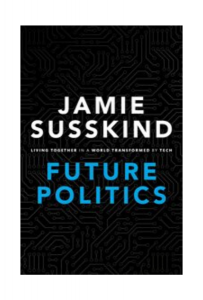 ‘Digital democracy’ is a phrase that was bandied about endlessly in the 2000s, with few people any the wiser as to what it could mean. So far the effect technology has had on politics has been largely driven by the Big Four tech companies, and not by considered thought. In Future Politics Jamie Susskind takes a legal rather than commercially-driven perspective, and speculates on some of the ways it could change the way we do politics – for good and bad. Could ‘delegating your vote to a trusted AI system save a lot of hours in the day’? Actually – isn’t that pretty much what tactical voting sites were already doing in the 2019 General Election?
‘Digital democracy’ is a phrase that was bandied about endlessly in the 2000s, with few people any the wiser as to what it could mean. So far the effect technology has had on politics has been largely driven by the Big Four tech companies, and not by considered thought. In Future Politics Jamie Susskind takes a legal rather than commercially-driven perspective, and speculates on some of the ways it could change the way we do politics – for good and bad. Could ‘delegating your vote to a trusted AI system save a lot of hours in the day’? Actually – isn’t that pretty much what tactical voting sites were already doing in the 2019 General Election?
Ros Taylor, Managing Editor, LSE Brexit blog
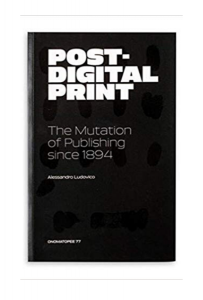 A book that has stood out for me this year has been Alessandro Ludovico’s Post-Digital Print: The Mutation of Publishing Since 1894. Alongside his academic work, Ludovico is best known as the editor of the online magazine Neural and for his artistic explorations of digital culture: in particular, Amazon Noir, a work that explored the limits of copyright by using Amazon’s ‘search inside the book’ feature to reconstruct and print entire books. The central premise of Post Digital Print is why, if (as we have been told on many occasions) physical print publication is dead, it hasn’t been replaced by digital forms of communication. Effectively deconstructing this question, the book presents the long history of the presumed death of print, which, surprisingly, starts as early as the late nineteenth century. It also describes the myriad ways in which traditional print and digital publication intersect and crossover with each other.
A book that has stood out for me this year has been Alessandro Ludovico’s Post-Digital Print: The Mutation of Publishing Since 1894. Alongside his academic work, Ludovico is best known as the editor of the online magazine Neural and for his artistic explorations of digital culture: in particular, Amazon Noir, a work that explored the limits of copyright by using Amazon’s ‘search inside the book’ feature to reconstruct and print entire books. The central premise of Post Digital Print is why, if (as we have been told on many occasions) physical print publication is dead, it hasn’t been replaced by digital forms of communication. Effectively deconstructing this question, the book presents the long history of the presumed death of print, which, surprisingly, starts as early as the late nineteenth century. It also describes the myriad ways in which traditional print and digital publication intersect and crossover with each other.
Drawing on Ludovico’s work on digital culture and art, the book is littered  with intriguing artistic examples of how digital and analogue publications shape and frame the way we interact with ‘content’. Why, for instance, as Tim Devin poses in the Email Flyer Project, does a print-out of a spam email carry so much more weight to readers than it did in its original digital form? Another of the book’s themes is how publication, digital and analogue, has at heart always been a process of network construction, connecting people with shared interests and agendas from across different social groups, be they avant-garde artists or people interested in how academic research impacts the wider world (as on the LSE Impact blog). The book is a must-read for anyone interested in the way digital communication continues to reshape publishing and what this might mean for the sector’s future. More importantly, considering the book’s subject matter, it is also available to download for free!
with intriguing artistic examples of how digital and analogue publications shape and frame the way we interact with ‘content’. Why, for instance, as Tim Devin poses in the Email Flyer Project, does a print-out of a spam email carry so much more weight to readers than it did in its original digital form? Another of the book’s themes is how publication, digital and analogue, has at heart always been a process of network construction, connecting people with shared interests and agendas from across different social groups, be they avant-garde artists or people interested in how academic research impacts the wider world (as on the LSE Impact blog). The book is a must-read for anyone interested in the way digital communication continues to reshape publishing and what this might mean for the sector’s future. More importantly, considering the book’s subject matter, it is also available to download for free!
As some light relief over the festive period, I have also decided to read David Lodge’s Nice Work. The book’s comic account of a mismatched factory director and a professor of English literature forced together by government reform of universities and higher education will no doubt provide a welcome break from editing the LSE Impact Blog…
Michael Taster, Managing Editor, LSE Impact blog
 In one of the most stimulating books I’ve read this year, Escravidão: Do primeiro leilão de cativos em Portugal até a morte de Zumbi dos Palmares, Vol 1. [Slavery: From the first slave auction in Portugal to the death of black leader Zumbi dos Palmares in Brazil], Brazilian journalist Laurentino Gomes describes the slave trade between Africa and the Americas. People, sugar and spices were the main ‘merchandise’ in a globalised trade environment involving Portuguese, Spanish, English, Dutch, American and Brazilian traders, African suppliers and Italian bankers. Between 1501 and 1867, 12.5 million people were forcibly carried across the Atlantic in the hold of ships, a gruesome voyage that often ended in death. In total, nearly two million enslaved Africans succumbed to physical and mental illness. The number of human bodies thrown overboard was so high that it changed the migratory patterns of sharks. This book won’t leave anyone indifferent. There’s a catch, though: it’s written in Portuguese. Publishers should be rushing to bring Escravidão to English-speaking readers.
In one of the most stimulating books I’ve read this year, Escravidão: Do primeiro leilão de cativos em Portugal até a morte de Zumbi dos Palmares, Vol 1. [Slavery: From the first slave auction in Portugal to the death of black leader Zumbi dos Palmares in Brazil], Brazilian journalist Laurentino Gomes describes the slave trade between Africa and the Americas. People, sugar and spices were the main ‘merchandise’ in a globalised trade environment involving Portuguese, Spanish, English, Dutch, American and Brazilian traders, African suppliers and Italian bankers. Between 1501 and 1867, 12.5 million people were forcibly carried across the Atlantic in the hold of ships, a gruesome voyage that often ended in death. In total, nearly two million enslaved Africans succumbed to physical and mental illness. The number of human bodies thrown overboard was so high that it changed the migratory patterns of sharks. This book won’t leave anyone indifferent. There’s a catch, though: it’s written in Portuguese. Publishers should be rushing to bring Escravidão to English-speaking readers.
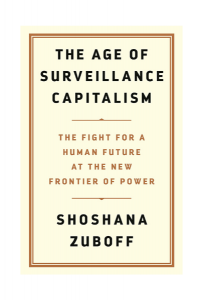 Few declarations are more baffling than ‘I have nothing to hide’ as a justification for not caring about one’s privacy. I have always been stumped when I had to articulate a response. Shoshana Zuboff’s The Age of Surveillance Capitalism came to my rescue. For brevity’s sake, I’ll mention just two of her many arguments. First, privacy as a mental health issue. She beautifully argues that we all need sanctuary, a space where we can look inward and build/nurture our individual identities away from prying eyes, where we’re not putting on a performance all the time. Second, instrumentarianism and social physics, which are contemporary extensions of B.F. Skinner’s behaviourism, by which big tech harvests our data, decodes our personalities and intervenes to change our behaviour to their advantage, all without our knowledge. It’s happening as we speak. And if many people still don’t understand what the privacy fuss is all about, it is because our collective reaction so far has been below optimal. Hopefully academic scholarship like The Age of Surveillance Capitalism will help change that.
Few declarations are more baffling than ‘I have nothing to hide’ as a justification for not caring about one’s privacy. I have always been stumped when I had to articulate a response. Shoshana Zuboff’s The Age of Surveillance Capitalism came to my rescue. For brevity’s sake, I’ll mention just two of her many arguments. First, privacy as a mental health issue. She beautifully argues that we all need sanctuary, a space where we can look inward and build/nurture our individual identities away from prying eyes, where we’re not putting on a performance all the time. Second, instrumentarianism and social physics, which are contemporary extensions of B.F. Skinner’s behaviourism, by which big tech harvests our data, decodes our personalities and intervenes to change our behaviour to their advantage, all without our knowledge. It’s happening as we speak. And if many people still don’t understand what the privacy fuss is all about, it is because our collective reaction so far has been below optimal. Hopefully academic scholarship like The Age of Surveillance Capitalism will help change that.
Helena Vieira, Managing Editor, LSE Business Review
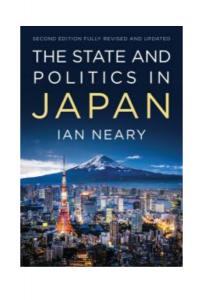 Japanese politics has an unfair reputation for being dull in comparison to other states in Asia. The country’s political system is highly stable, a fact underlined by Shinzo Abe recently becoming Japan’s longest-serving prime minister. But behind this stability there is an ongoing debate about how Japan’s post-war political framework impacts on its ability to take an active role in global affairs. Abe’s long-held aspiration to revise the Japanese constitution has been a recurring theme during his period in office.
Japanese politics has an unfair reputation for being dull in comparison to other states in Asia. The country’s political system is highly stable, a fact underlined by Shinzo Abe recently becoming Japan’s longest-serving prime minister. But behind this stability there is an ongoing debate about how Japan’s post-war political framework impacts on its ability to take an active role in global affairs. Abe’s long-held aspiration to revise the Japanese constitution has been a recurring theme during his period in office.
This notion of a state at a crossroads is essentially the starting point for Ian Neary’s updated second edition of The State and Politics in Japan, which particularly focuses on the development of Japanese politics from the end of the Second World War to the present. There is a suitable balance struck between maintaining a lively historical narrative and providing a detailed look at how the political system functions in practice. It both dispels some persistent myths about Japan and gives an insight into how many of the country’s most recognisable political features have emerged.
The overall impression I was left with is that while the country may be a beacon of stability today, it has taken a curious path to reach this point. For over 200 years, Japan enforced a policy of closed borders and virtual isolation, later created an empire that continues to cast a shadow over relations with some of its closest neighbours and ultimately became a manufacturing superpower widely courted as a partner by politicians in the West. Far from being dull, I found The State and Politics in Japan presented a rich picture of a country with a unique history that is currently facing up to a series of challenges it may be ill-equipped to deal with.
Stuart Brown, Research Associate at the London School of Economics and Managing Editor of EUROPP – European Politics and Policy
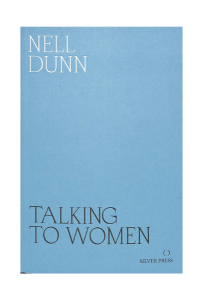 At the end of 2019, I recommend three autobiographical works, of sorts, written by women. In January I found myself immersed in the reissue of Nell Dunn’s Talking to Women. First published in 1965, the book offers a set of intimate conversations between Dunn and nine female friends from disparate backgrounds but connected by, if anything, ‘a belief in personal fulfilment’, in the words of Dunn. Opening with a particularly poignant exchange with the late Pop artist Pauline Boty, the discussions wander through candid reflections on sex, marriage, friendship, motherhood and work, describing the ‘muddle’ of these aspects of life with a striking clarity and honesty. Above all, the conversations testify to the still fraught, still urgent necessity of carving time and space for (self-)creation: what 24-year-old Suna describes as that ‘peculiar sort of itch […] a real need, a tactile need to take hold of things by solidifying them, either in paint or words’.
At the end of 2019, I recommend three autobiographical works, of sorts, written by women. In January I found myself immersed in the reissue of Nell Dunn’s Talking to Women. First published in 1965, the book offers a set of intimate conversations between Dunn and nine female friends from disparate backgrounds but connected by, if anything, ‘a belief in personal fulfilment’, in the words of Dunn. Opening with a particularly poignant exchange with the late Pop artist Pauline Boty, the discussions wander through candid reflections on sex, marriage, friendship, motherhood and work, describing the ‘muddle’ of these aspects of life with a striking clarity and honesty. Above all, the conversations testify to the still fraught, still urgent necessity of carving time and space for (self-)creation: what 24-year-old Suna describes as that ‘peculiar sort of itch […] a real need, a tactile need to take hold of things by solidifying them, either in paint or words’.
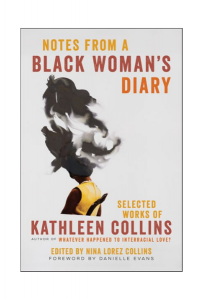 Technically published as part of the ‘Penguin Women Writers’ series in 2018, I was also swept away and along by Sara Suleri’s Meatless Days, her 1989 experimental memoir that buries into life (and loss) in the newly-created Pakistan. In her introduction to the book, Kamila Shamsie perfectly captures the daunting beauty of Suleri’s ‘high wire act of metaphorical language’. She also pinpoints what the book devastatingly underscores: not only ‘what people do to our lives by being in them’, but also ‘what people do to our lives by ceasing to be in them’. Finally, I was eager to obtain Kathleen Collins’s Notes from a Black Woman’s Diary, following her posthumously published short story collection, Whatever Happened to Interracial Love?. Edited by her daughter Nina Lorez Collins, this new volume includes unpublished short stories and plays, excerpts from her diaries and samples of her letters but also – thrillingly – the screenplay for Collins’s majestic film Losing Ground (1982). Made prior to her death in 1988 and recently restored by Milestone Films, Losing Ground is one of the first feature-length dramas directed (as well as written and edited) by a black American woman and is definitely a must-see alongside this list of must-reads.
Technically published as part of the ‘Penguin Women Writers’ series in 2018, I was also swept away and along by Sara Suleri’s Meatless Days, her 1989 experimental memoir that buries into life (and loss) in the newly-created Pakistan. In her introduction to the book, Kamila Shamsie perfectly captures the daunting beauty of Suleri’s ‘high wire act of metaphorical language’. She also pinpoints what the book devastatingly underscores: not only ‘what people do to our lives by being in them’, but also ‘what people do to our lives by ceasing to be in them’. Finally, I was eager to obtain Kathleen Collins’s Notes from a Black Woman’s Diary, following her posthumously published short story collection, Whatever Happened to Interracial Love?. Edited by her daughter Nina Lorez Collins, this new volume includes unpublished short stories and plays, excerpts from her diaries and samples of her letters but also – thrillingly – the screenplay for Collins’s majestic film Losing Ground (1982). Made prior to her death in 1988 and recently restored by Milestone Films, Losing Ground is one of the first feature-length dramas directed (as well as written and edited) by a black American woman and is definitely a must-see alongside this list of must-reads.
Rosemary Deller, Managing Editor, LSE Review of Books
Note: This reading list gives the views of the contributors, and not the position of the LSE Review of Books blog, or of the London School of Economics.
Feature image is courtesy of 🇨🇭 Claudio Schwarz | @purzlbaum on Unsplash.








